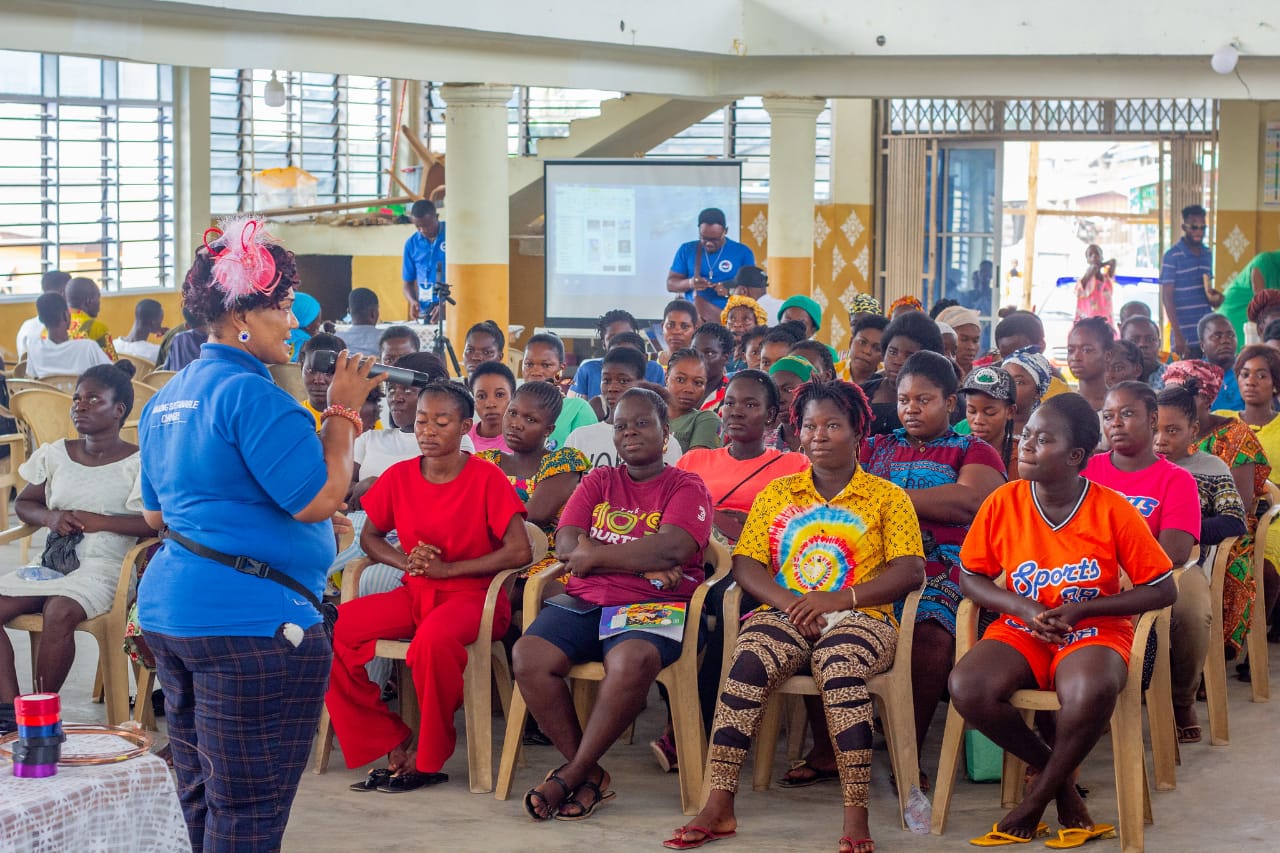
…Augustina Akosua Asor Tufuor’s journey with Tropical Snacks
As the founder of Tropical Snacks, Augustina Akosua Asor Tufuor has turned her desire of adding to efforts at reducing post-harvest loss and keen eye for business into a thriving enterprise – one that not only delights taste-buds but also supports local farmers.
Her story is one of determination, resilience and a deep commitment to making a positive impact on her community and the environment.
Read on as she narrates her journey with this week’s B&FT Inspiring Startups Column!
Background
Born in Koforidua in the Eastern Region of Ghana, Augustina is the youngest of five children born to Mr. Jude Alexander Tufuor (of blessed memory) and Mrs. Anastasia Owusu Tufuor. Her early education took her from King of Glory to Madonna School, to Association International School in Accra then Bishop Bowers School, where she completed her primary and junior high school education.
Reflecting on her early years, Augustina recalls, she was always drawn to subjects that allowed her to create and innovate, which led her to initially wanting to pursue visual arts at Holy Child Senior High School.
Despite her initial passion for the arts and a dream of becoming an architect, Augustina’s journey took a different turn when she was redirected to study business instead of visual arts.
“At first, I was hesitant. I wasn’t a fan of math and calculations, but I decided to trust that this was part of a greater plan for me,” she shares. This decision would prove pivotal, as she not only excelled in her business studies but also laid the foundation for her future endeavours.
After completing her high school education, Augustina’s academic journey led her to the University of Ghana where she pursued a degree in Business Administration with a major in Marketing. Despite moments of uncertainty, particularly when choosing between finance and marketing, she found her true calling in the latter. “I realised that marketing was where my passion truly lay. It combined creativity with strategy, and that resonated with me deeply,” she explains.
Augustina’s academic achievements culminated in her graduating with First Class Honours, a testament to her dedication and hard work. This strong educational background later served as a crucial asset in her entrepreneurial journey, providing her with the skills needed to navigate the complexities of running a business.

Birth and Motivation
The seeds of Tropical Snacks were sown during Augustina’s third year at the University of Ghana, when she enrolled in a fundamentals of entrepreneurship class.
“That class was a game-changer for me. It opened my eyes to the possibilities of entrepreneurship and inspired me to think about starting my own business,” she recalls.
During a visit to her mother in Asaaka, a small town in the Eastern Region, Augustina observed a disheartening sight: heaps of unsold produce – primarily plantais, cassava and sweet potatoes – left to rot at the market centre.
This wastage was a result of the high cost of transporting unsold goods back to farmers’ villages. “It struck me that this was not just a problem for Asaaka, but a widespread issue across the country. I knew I wanted to do something to help these farmers and reduce post-harvest losses,” she says.
She added that: “On the next market day, I went to buy some plantain to make some chips for personal consumption and took some back with me to Accra for people to taste”.
Her love for snacks, particularly plantain chips, coupled with this newfound awareness sparked the idea for Tropical Snacks. “I decided to start a snack production business that would not only provide consumers with healthy, natural snacks but also offer a market for the produce of these farmers,” Augustina explains.
The name ‘JOY’ for her product line was inspired by the joy and relief she saw on the faces of farmers she bought from, as well as the satisfaction of her customers.
After completing her national service at a leading bank in Ghana, Augustina found herself at a crossroads. The demanding nature of her job left little time for meals, leading her to rely on snacks. However, the unhealthy ingredients in most commercially available snacks prompted her to take her business idea seriously. “I wanted to create snacks that were not only delicious but also free from artificial additives, preservatives and excessive salt and sugar,” she says.

With this motivation, she began producing and selling plantain chips to her colleagues at work, and later expanded her market to university campuses. Despite initial challenges, such as inconsistent supply and impact of the COVID-19 pandemic, Augustina’s determination never wavered. She used the lock-down period to refine her business plan, redesign her packaging and secure Food and Drugs Authority approval for her products. Today, Tropical Snacks is recognised for its high-quality, natural snacks that are both healthy and affordable.
View of the Sector
Augustina operates in the natural snack industry, a sector that is rapidly growing both locally and globally. With an increasing number of consumers becoming health-conscious, especially in the wake of COVID-19 pandemic, there is a significant shift toward snacks made from natural ingredients. “The global natural snack market is expected to grow to over US$152 billion by 2030,” Augustina notes, adding: “This presents a tremendous opportunity for businesses like mine that focus on producing snacks without artificial additives”.
However, she also acknowledges the challenges posed by climate change which can lead to reduced harvests and affect the availability of raw materials.
“The unpredictable weather patterns and reduced rainfall are making it increasingly difficult for farmers to produce consistent yields,” she noted. Despite these challenges, Augustina remains optimistic about the industry’s future and her business.
SDG Targets
Tropical Snacks is more than just a business; it is a vehicle for achieving broader social and environmental goals. Augustina’s commitment to reducing post-harvest losses and supporting local farmers aligns with several Sustainable Development Goals (SDGs), particularly SDG 2 (Zero Hunger) and SDG 12 (Responsible Consumption and Production).
By sourcing produce directly from farmers and transforming it into value-added products, Tropical Snacks contributes to reducing food waste and ensuring that farmers receive fair compensation for their labour.
“Our goal is to create a sustainable business model that not only benefits consumers but also uplifts the communities we work with. By providing a stable market for farmers and promoting healthy eating habits, we are contributing to the well-being of both people and planet,” Augustina said.
Challenges
Like many startups, Tropical Snacks has faced its share of challenges. The increasing cost of raw materials and transportation, fluctuating prices and the impact of climate change are some of the significant hurdles the business has had to overcome.
She noted that: “The price of raw materials can change in seconds and this greatly affects our operations, especially since we are committed to maintaining the same quality of our products”.
Another challenge is the inconsistent supply of produce, which can lead to disruptions in production. Despite these difficulties, her resilience and resourcefulness have enabled her to navigate these challenges and continue growing her business.
Vision
Looking ahead, her vision is to become the leading natural-snack brand in Ghana and one of the top brands globally.
“In the next five years, we aim to complete our mini-processing space, increase our production capacity and expand our market reach across Ghana and the West African diaspora in Germany, the Netherlands, and United Kingdom,” she stated.

In addition to expanding her product range to include dried-ruit snacks such as coconut, mango and pineapple chips – as well as vegetable chips, Augustina is committed to growing her team and increasing the number of farmers she works with.
Support for Small Businesses/Entrepreneurs
“In terms of support, I believe entrepreneurs should be given a combination of capacity training, business development support as well as affordable financing options.
“Entrepreneurs also need affordable financing options such as grants and soft loans in order to implement the strategies they develop from the capacity trainings and business development support…if capacity trainings are given time and time again without the affordable financing options to implement strategies, then the trainings sometimes just end there, as most strategies need financing to implement them – which most entrepreneurs lack, especially in the beginning stages of their business,” she stated.
Advice to aspiring entrepreneurs
“The entrepreneurial journey is tough, but so is every other profession or job-path. Stay focused, disciplined and be willing to modify your ideas as many times as necessary until they make business-sense,” she advises.
She also emphasises the importance of continuous learning and capacity building. “Make sure to continuously build your capacity so that you grow with your business. Manage your finances wisely and pray for strength, because the journey is tough but can be very rewarding when you succeed,” she adds.
Contact details
Call or WhatsApp: 233-55-717-6191
Instagram: [@snackonjoy] (https://www.instagram.com/snackonjoy)
Facebook: [@snackonjoy] (https://www.facebook.com/snackonjoy?mibextid=LQQJ4)
X: [@snackonjoy] (https://x.com/snackonjoy?s=21)
TikTok: [@snackonjoy] (https://www.tiktok.com/@snackonjoy)
LinkedIn: [Tropical Snacks] (https://www.linkedin.com/company/tropicalsnacks/)
The post Inspiring Startups with Juliet ETEFE: Reducing post-harvest losses, one snack at a time appeared first on The Business & Financial Times.
Read Full Story
















Facebook
Twitter
Pinterest
Instagram
Google+
YouTube
LinkedIn
RSS